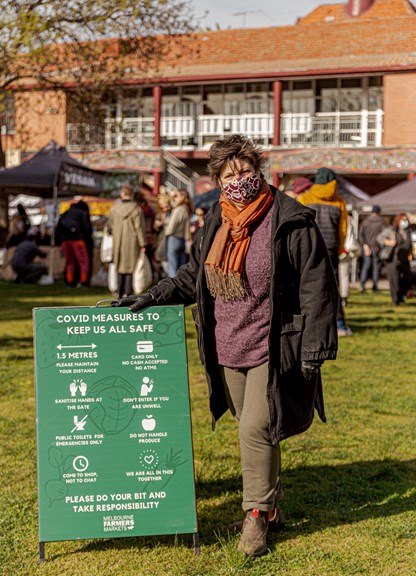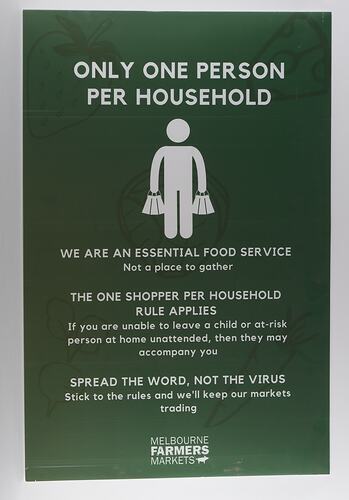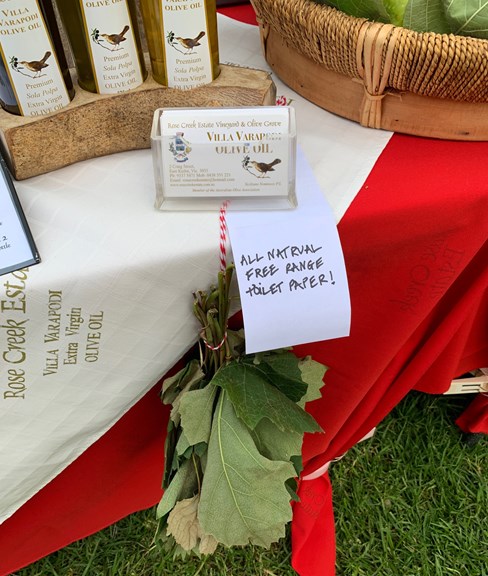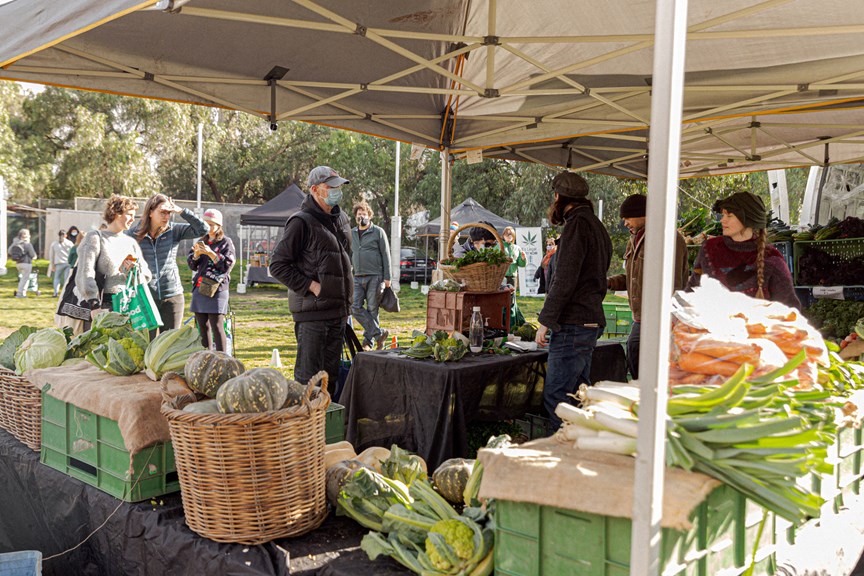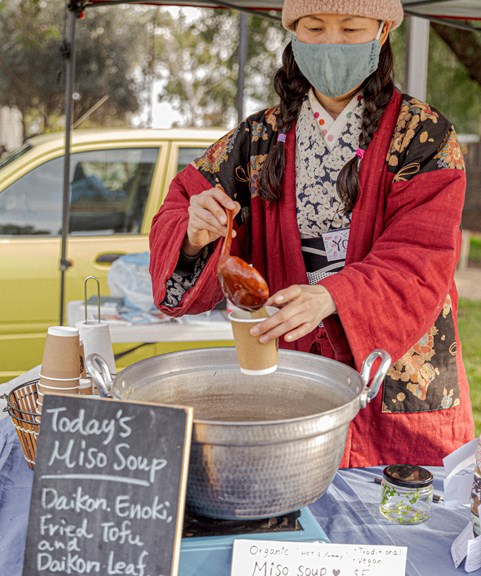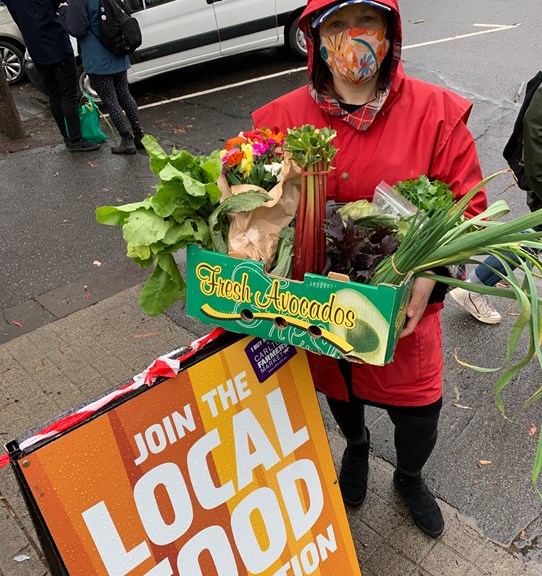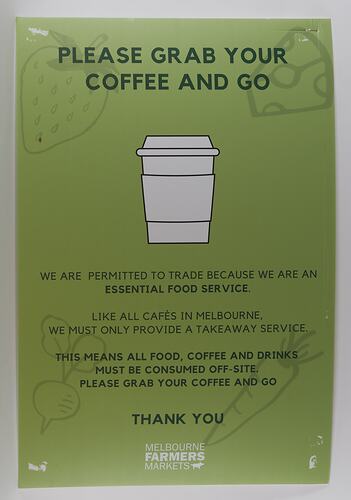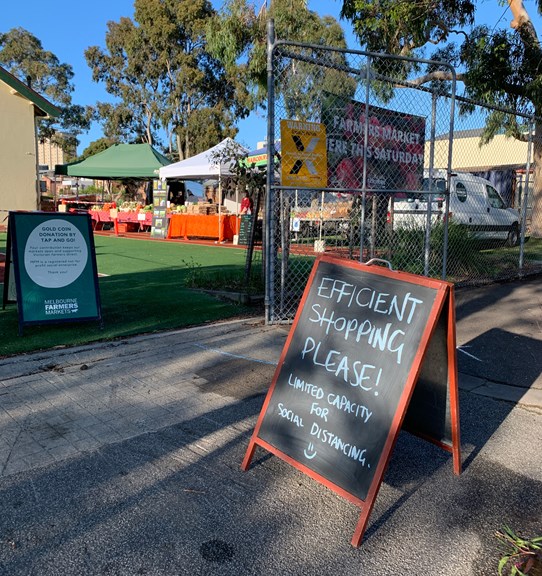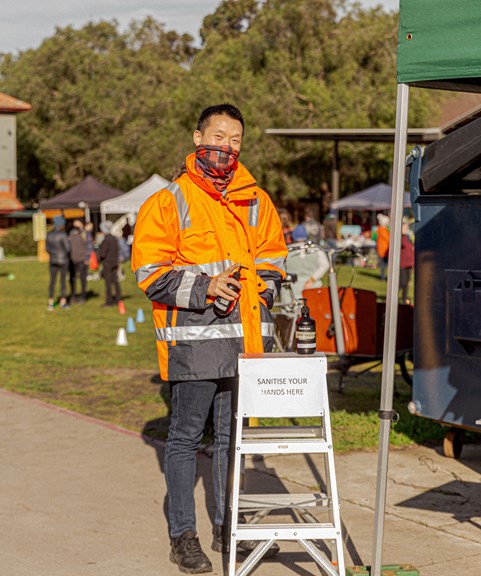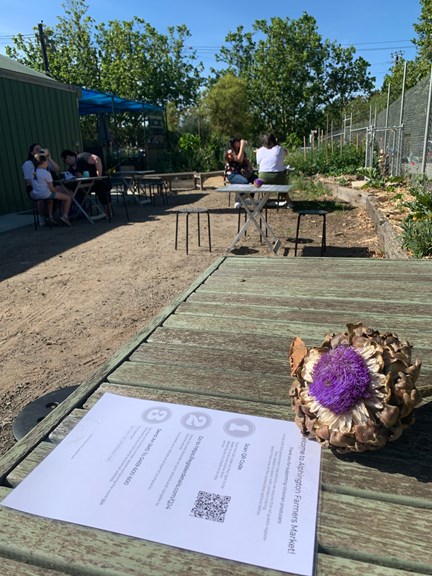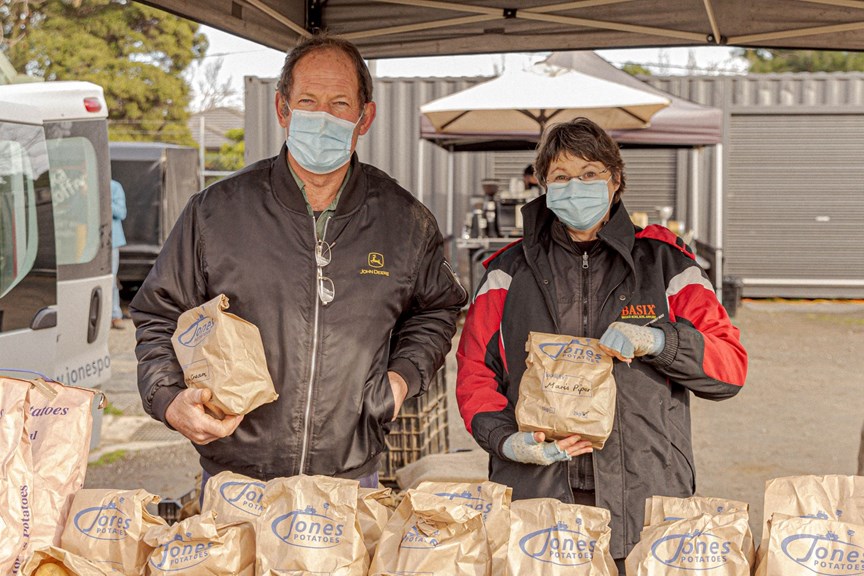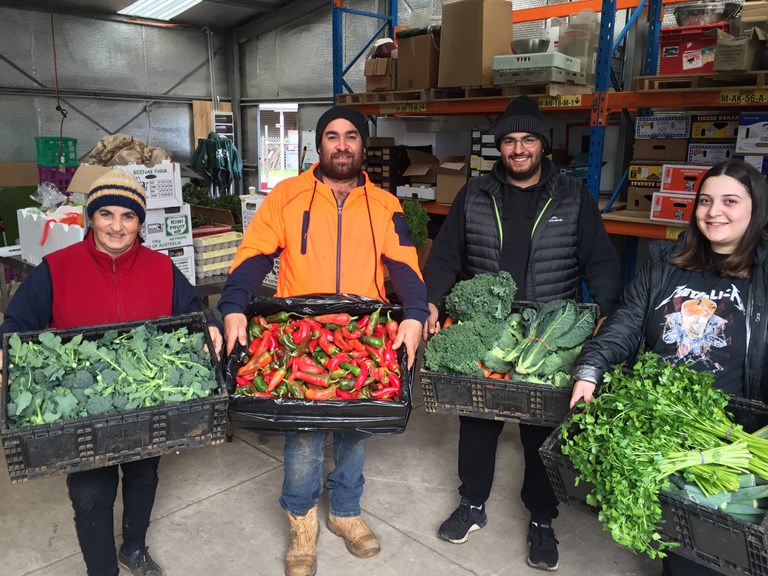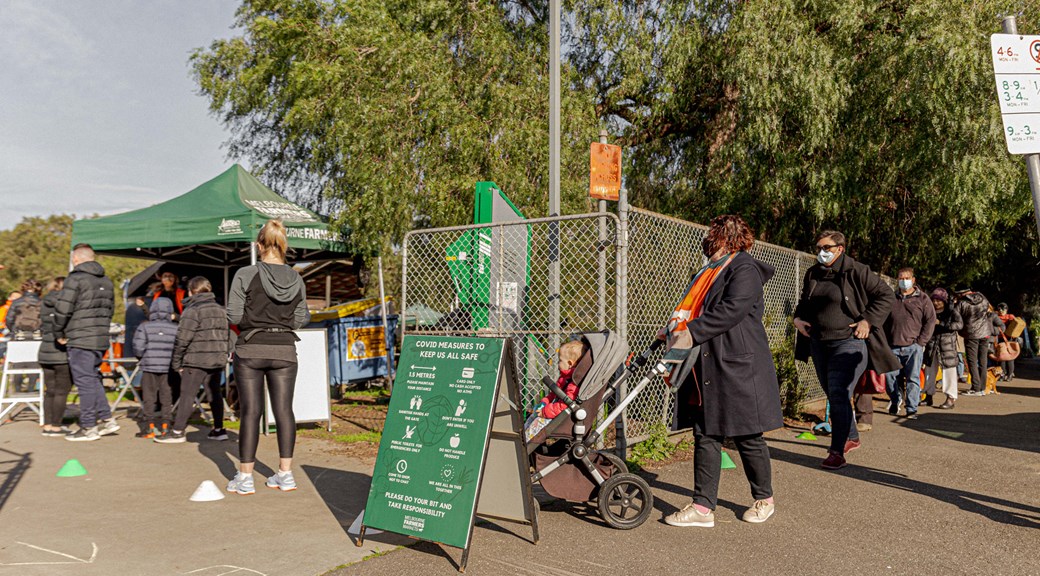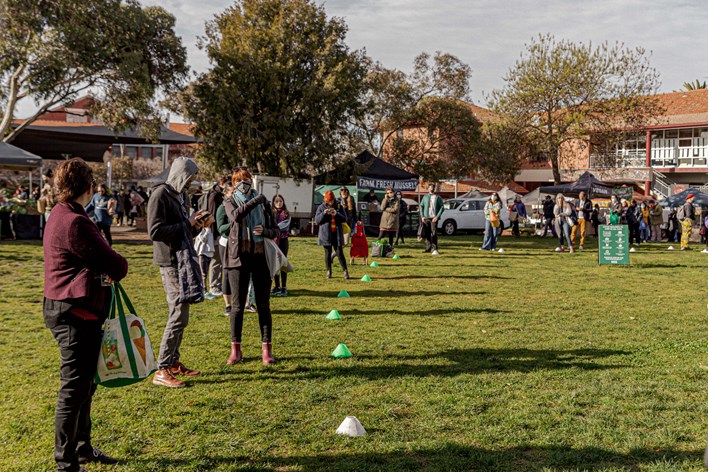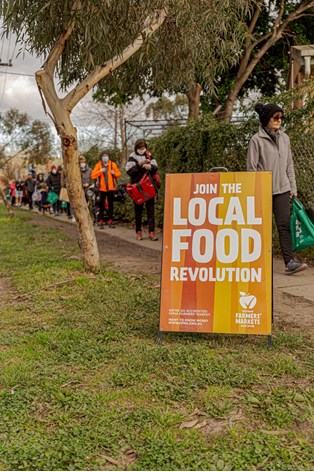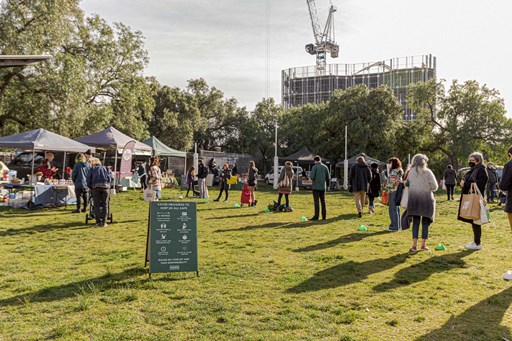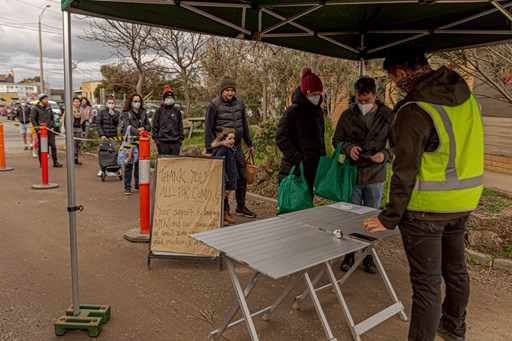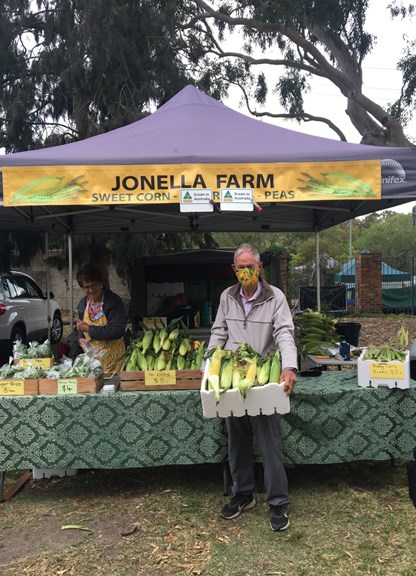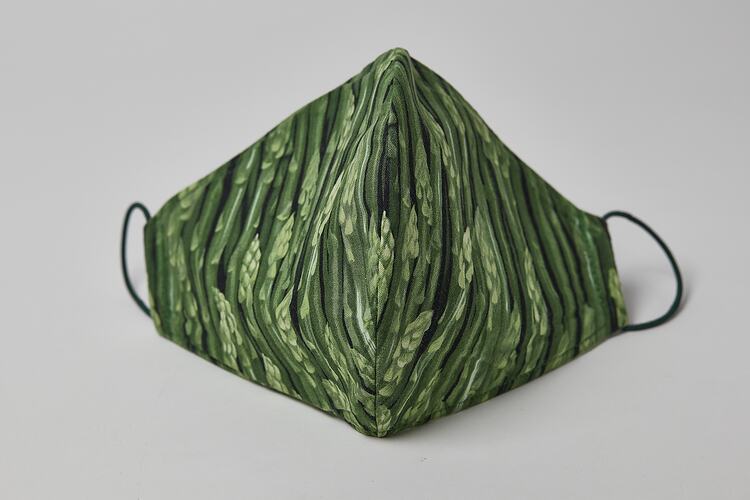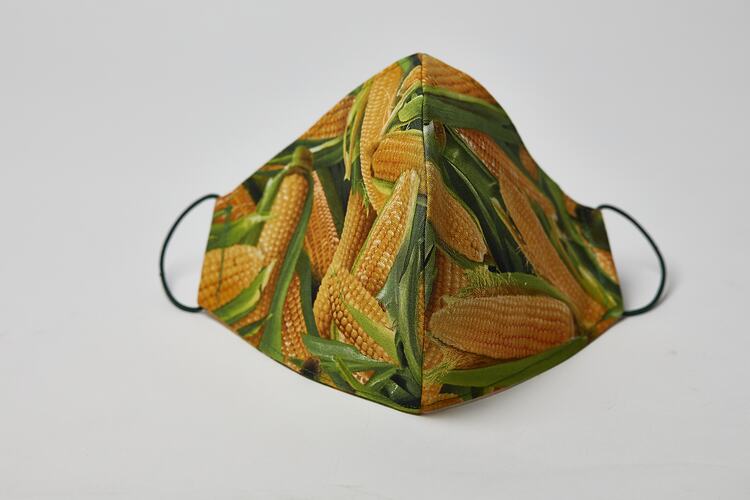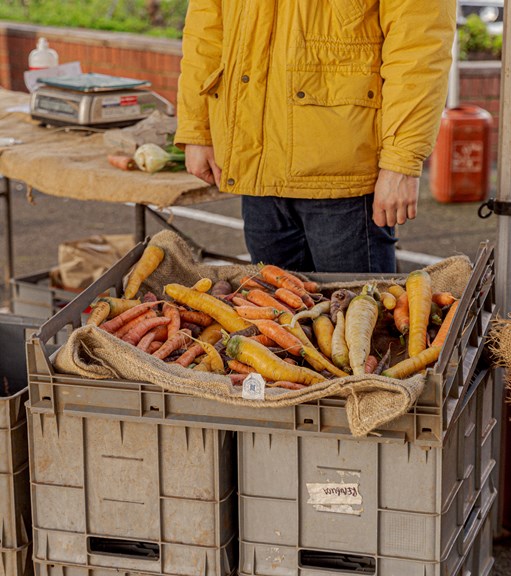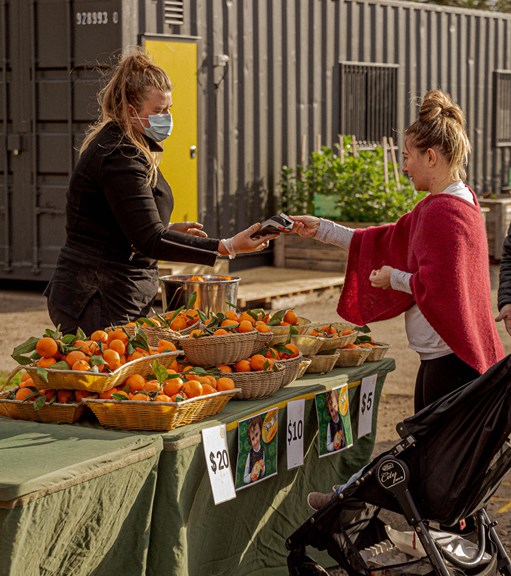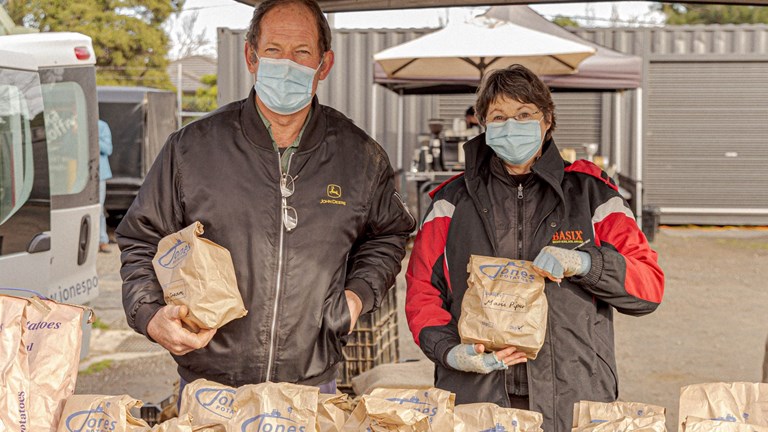
Feeding Community and the Melbourne Farmer's Markets
During the COVID-19 pandemic, farmers' markets across Victoria have proved to be an essential service, providing fresh produce to consumers whilst simultaneously supporting farmers – and communities in need – through challenging times.
While many farmers' markets have continued to remain in operation across the State during the pandemic, this story is based on an interview with Director of the Melbourne Farmers Markets (MFM), Miranda Sharp, and focuses particularly on the MFM’s response to COVID-19.
‘Like everyone, I think our first reaction was shock,’ recalls Miranda Sharp of the announcement of Melbourne’s first COVID-19 lockdown in March 2020. ‘Can this really be happening?’
As the director of the Melbourne Farmers Markets (MFM), Miranda’s primary concern was of the 150+ small-scale food producers who were trading at their markets each week, and what this pandemic would mean for their businesses and livelihoods.
‘We feel huge commitment to [the farmers and small-scale food producers] and the opportunity we offer them to connect with their customers,’ she says.
Melbourne Farmers Markets is a not-for-profit social enterprise that was established with an aim of supporting local Victorian farmers and strengthening relationships between farmers and urban consumers. Although Miranda and the team were confident food markets would be considered an essential service and therefore allowed to stay open like supermarkets, they knew they would have to swiftly and drastically adapt their mode of operations.
‘There was never any question about closing [unless we absolutely had to],’ she says. ‘We just had to urgently understand the safety protocols and find ways to keep trading within the regulations.’
Out of the seven markets across Melbourne —including Abbotsford, Alphington, Carlton, Collingwood, Coburg, Gasworks and the University of Melbourne—four of the sites were closed down, with just three continuing to operate throughout lockdowns.
‘So our collective income was halved [but] our workload increased dramatically,’ Miranda explains. ‘I’ve never worked so hard or had such a stressful year, and it’s not over yet!’
Food security and having access to fresh food became a key concern for many Victorians during the emergence of the pandemic.
Fears about the fragility of international and domestic food supply chains alongside the announcement of lockdowns and ‘Stay at Home’ restrictions led many consumers to rush to supermarkets and shops to fill their cupboards.
Panic buying, where shelves were stripped bare of produce (and toilet paper!), became one of the earliest and most potent symbols of the public fear response to the pandemic.
But for local farmers and food producers, it was business as usual, because, in the words of Miranda, ‘seasonal food keeps on growing, regardless of a pandemic.’ Miranda and the MFM team were astonished by the chaos unfolding at supermarkets:
‘We watched on, mystified by the collective response [of panic buying] when we had such reassurance from growers, retailers and government that there was no need. We saw a steady and adequate supply, fantastic range and quality coming week in week out to our markets.’Miranda Sharp
So drastic was the public’s fear about food security, that a press release was issued by the National Farmers Federation in March 2020 to try and reassure people.
‘Australians do not need to be concerned about a national food shortage’, it read. ‘Farmers are getting on with the job, continuing to produce the meat, grains, milk, fruit and vegetables that we all love and rely on. […] Unlike other countries, Australians’ access to home-grown, quality, safe food is extremely secure.’
Indeed, for regular market-goers, the Melbourne Farmers Markets ongoing operation through 2020 was a saving grace. To be able to maintain access to the best local fresh food, as well as have a valid opportunity to get out of the house and be around other people in a Covid-safe way, was heartening.
‘So many people said the markets were a highlight of their week’, reflects Miranda proudly. ‘Quite a few people, including farmers themselves, said they wouldn’t have made it through without the farmers' markets saying open.’
But adapting the markets to be Covid-safe was a challenge, both for staff and customers. The relaxed and festive atmosphere that farmers markets are known for had to be dramatically curtailed in light of restrictions. Hand sanitisation, density controls, 1.5m queueing, discouraging social interactions and maintaining strict social distancing were some of the measures put in place to be able to meet the Victorian Government and DHHS requirements.
Miranda and her team had to do ‘twice the preparation, [double] market day staff, endlessly [update] public and stallholder communications’ and exert a ‘massive effort in COVID detail and the necessary enforcement of protocols and procedures.’
‘That has been a great strain on us,’ Miranda adds. ‘In personnel and financially because the situation constantly changed and we needed to be accurate in detail, messaging and in practise.’
But the overwhelmingly positive response from farmers, retailers and the community was indicative of how necessary and bolstering it is to have that direct connection between local food producers and the wider community.
‘We felt very fortunate during Covid to be able to continue doing what we love which is bring our produce to the farmers markets,’ says employee of Jonella Farm Illona Brzezowski. ‘The feedback from our customers was that the ability to still be able to go out and obtain our fresh produce straight from the farm helped to ease the stress that they were feeling from having to be in lockdown.’
Keeping the markets open was also a crucial support for farmers, who were now faced with the problem of how to keep their businesses afloat. For many Victorian farmers, the sudden closure of restaurants and cafés in March led to orders being drastically reduced or cancelled overnight. Regardless of effort, some farmers were faced with excess crops.
In response to this situation, Miranda reflects that ‘MFM immediately swung into action, diverting these surplus crops into emergency food relief through our involvement in the social enterprise collective, Moving Feast, which had been founded to support vulnerable Victorians to access fresh food.
This was most significant with the Saturday afternoon announcement in July of the hard lockdown of nine public housing towers in North Melbourne, effective immediately. Moving Feast mobilised 1000 fresh food parcels in 24 hours to be distributed amongst residents of the Flemington, Kensington and North Melbourne public housing estates and MFM sourced fresh produce and diverted the losses that would have been encountered by farmers who trade at the Sunday farmers market in Flemington, including 650 dozen eggs, 2.5 tonnes vegetables and almost a tonne of fruit.’
As COVID-19 case numbers continued to rise during the “second wave” of the pandemic in Victoria, things got tougher. One Friday morning in late August, Miranda woke to find that the Victorian Government and Department of Health and Human Services (DHSS) had announced overnight that farmers markets would have to close immediately, a decision that she describes as ‘gut-wrenching’.
Thankfully for the MFM team, the announcement was revoked. This came after a huge collective effort of ‘lobbying, objection and enquiry’ on the part of the MFM, Victorian Farmers' Markets Association (VFMA), managers of nine other metro-based farmers' markets, journalists, politicians and MPs (including the Minister for Agriculture, the Hon. Jaclyn Symes), growers and customers, and staff members at the Department of Agriculture. At 7pm that night, following an intense day of collective campaigning, the Minister for Agriculture declared that farmer's markets would be permitted to trade as essential services after all.
‘And we have done so ever since,’ smiles Miranda. ‘It was incredibly gratifying to see such media, industry and public support for our collective efforts…’
Indeed, the social media gratitude for farmers' markets was overwhelming. ‘This is what community spirit is all about,’ one user posted on the MFM Instagram. ‘Keep up the great work.’
‘Let’s hope the market can continue during this difficult time,’ read another post on Facebook. ‘It’s a source of not only of good food but a pleasurable experience for shopping as well.’
At a time when face-to-face contact was all but forbidden, and Melbournians were only allowed to leave their home once a day for one of four essential reasons, being able to safely attend a community market was a lifeline for many. It not only boosted the physical health of customers and staff by providing access to fresh food, but was equally important for mental wellbeing in its promotion of (socially-distanced) community connection.
Having that ‘legitimate opportunity to be outdoors, with the passing exchange between neighbours and families’ brought on an inspirational sense of ‘public delight’, says Miranda.
‘The outing gave [everyone] something to look forward to,’ agrees Ilona. ‘And the produce that they know and love allowed them to create delicious and nutritious meals for the family like they usually did.’
Employee of Weyhill Garlic Farm, Amanda Masters showed her enthusiasm for the continued operation of the markets by making a series of food-themed masks. According to Ilona, this added ‘some light-hearted relief to the requirement of wearing face masks’ and represented the seasonal produce on offer at the time, such as corn or asparagus.
The unique opportunities of community support offered by the farmers markets throughout the long and arduous COVID-19 lockdowns have helped foster a new appreciation for the local food and farming industries. Something positive that Miranda says has emerged from the pandemic is an overwhelming interest from the general public to take a more active role in sustaining these small-scale food practices.
‘So many people have enquired about getting involved in the community farmgate, emergency food relief, composting, waste diversion and being involved in food growing,’ says Miranda. ‘It’s been great to share it and demonstrate our belief that community-driven activation works!’
In particular, MFM have become much closer with the Alphington Community Centre, Darebin Information Resource Service, their local CWA, and surrounding parklands.
‘I feel confident that these relationships will develop further,’ she says.
‘So, if there’s a lighter side to this year, it’s the new and better relationships and collaborations that have emerged.’Miranda Sharp
The foundation of Moving Feast has also resulted in a lasting and positive legacy for the founding partners and their broader communities.
‘We came together initially for emergency food relief,’ Miranda recalls, ‘but [are] now working through to recovery and rejuvenation, with food central to our objectives. We strive to connect and include every neighbourhood in our goals of building a healthier local food system that’s accessible to all.’
And Miranda’s hopes for the future?
‘I sincerely hope that this new-found appreciation of our local food system lasts. It’s an easy buzz expression, “We all want to know where our food comes from” – so, really, what have we learned and what are we doing about it?’Miranda Sharp
What’s becoming increasingly clear is just how significantly the COVID-19 pandemic has altered the perspectives and priorities of so many people, making them reconsider those fundamental aspects of everyday life that had been taken for granted, such as access to fresh food and face-to-face social interaction.
‘Now is the time to embrace some changes for the better,’ concludes Miranda. ‘For all our sophistication in a technological online world, really, all we want to do is to be together.’
With the support of the Office for Suburban Development, a series of objects, photographs and stories from the Melbourne Farmer’s Markets Association have been acquired into Museum Victoria’s State Collection for posterity. They will provide a lasting reminder of the important role of local food movements, farmers, food producers and consumers – as well as communities coming together to support one another – during COVID-19.
Museums Victoria acknowledges the many farmer's markets and farmers across the State of Victoria, and Australia-wide, that have responded to the COVID-19 pandemic. This story was collected by Nick Crotty and Catherine Forge, and written by Charlotte Callander and Catherine Watt, in collaboration with Miranda Sharp and the Melbourne Farmers Markets.
